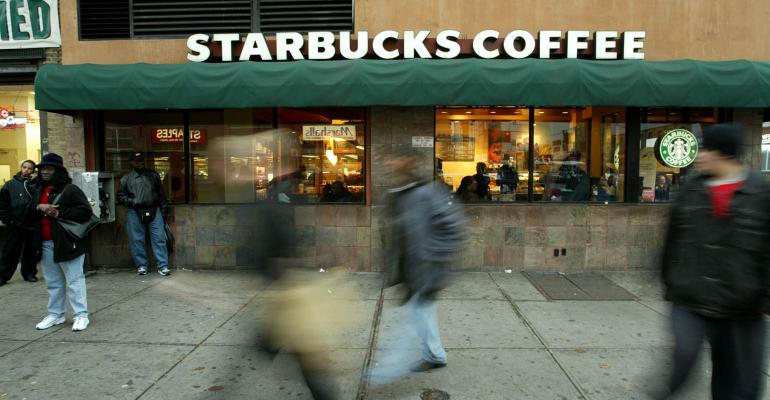In an environment where major retailers are closing stores left and right—take Gap Inc.’s announcement last week that it will close 200 more underperforming Gap and Banana Republic stores—it has struck some industry experts as unusual that one of the country’s largest mall REITs is suing one of the country’s best-known retail brands.
But while the lawsuit filed by Simon Property Group last month against Starbucks has some experts scratching their heads, it is likely a one-off situation, they say.
In the civil complaint, filed in an Indiana superior court at the end of August, Simon states that Starbucks has indicated to the mall operator that it plans to close 78 Teavana stores, prematurely ending the vast majority of its leases. In a press release announcing the company’s second-quarter results, Starbucks indicated it will close all of the 379 Teavana stores as “many of the company’s principally mall-based Teavana retail stores have been persistently underperforming.” Simon argues in the complaint that Starbucks is far from struggling financially, and Starbucks executives told investors during earnings calls that the Teavana brand has profitable stores and that Starbucks’ tea business has grown since Teavana was launched in the United States. Simon, citing the potential damage the mass store closures would have on its tenant mix and reputation, among other factors, is asking that the court enforce the leases and order the stores to remain open.
Simon did not respond to a request for comment, and a Starbucks spokesperson says the chain’s executives are “responding to the lawsuit and are working to resolve this dispute.”
When tenants sign leases to occupy space in a mall, the leases are not only contracts that obligate that rents and insurances are paid—they also require that businesses stay open and operating, says Joshua Stein, a commercial real estate attorney and sole proprietor of Joshua Stein PLLC in New York. This is because malls are like bee hives: one closed store can affect the rest of the mall environment, Stein says.
On the one hand, it is unusual for a company that is not struggling to announce the closure of multiple stores simultaneously, he notes. However, part of the mall operation business is to deal with tenants closing and opening, he adds. “Stores come and go all the time. That’s part of operating malls,” Stein says.
It is likely that the case will not have much of an effect on the industry, according to Stein. This is because of what Simon is asking—not just that Starbucks pay to end its leases early, but to keep their stores running. Typically, judges are unwilling to grant affirmative injunctions, or rulings that force someone to do something, as opposed to writing a check, Stein says. “That would be sort of a big deal, but not unheard of,” he notes.
Ultimately, the case is a commercial dispute over leases in default, meaning a judge may tell Simon to sue the tenant to get a judgement, Stein predicts. But really, the two companies should be negotiating, especially as Simon likely has dealt with tenants ending leases early on many previous occasions, he says. “It’s standard mall business, except normally you negotiate these situations.”
The case comes at a time when stores are closing frequently. The U.S. appears on pace this year to open more stores than in 2016—so far there have been close to 3,400 store openings, up 58 percent year-over-year, according to the most recent tracker from think tank Fung Global & Retail Technology. However, there have been more than 5,800 major store closure announcements so far this year, more than double all of 2016’s 2,051 closures, according to the tracker. By the end of the year, the U.S. will see close to 9,500 store closure announcements, the firm predicts.
Meanwhile, the 2016 retail vacancy rate of 8.2 percent edged to 8.0 percent for 2017, according to Cushman & Wakefield’s U.S. Macro Forecast from May. In 2016, net absorption nationally was 25.6 million sq. ft., but in 2017 it dropped to 11.3 million sq. ft., according to the report. Simon’s occupancy rate also appears to be dropping: For U.S. malls and outlets, Simon’s occupancy rate was 95.2 percent at the end of June, down a 160 basis points from 96.8 percent at the end of 2016.
The case may come down to how much damage Simon might experience from Starbucks’ decision to leave, as in today’s environment, an operator could be concerned when so many stores are closing, says Howard Davidowitz, chairman of New York-based retail consulting and investment banking firm Davidowitz & Associates.
“We really are in a new world—we really are—with the number of closings, with the number of bankruptcies,” Davidowitz says. “We’re only in the second inning of the problem.”
Typically, retailers only close stores for two reasons: if they are facing a severe threat of bankruptcy or if the stores are not performing well. In the first scenario, the tenant can appeal to the owner to break a lease early because it cannot afford it. In the second, there are usually negotiations to prematurely end a lease, with the tenant paying a sum to the owner, Davidowitz says.
Mall operators often also do not mess around with big retailers like Starbucks, and instead will work to negotiate with them—making this case unusual and likely a one-time scenario, Davidowitz says. “I don’t think it’s going to change the way anything works,” he notes.The Starbucks brand is known around the globe, but it makes sense that the Teavana offshoot may not be as successful as hoped, says Richard Rizzuto, a vice president at real estate services firm Transwestern who is based in New Jersey and specializes in retail. Typically, a lawsuit would be triggered if a tenant refused to pay the landlord some sort of compensation required by the lease, or if the landlord had co-tenancy clauses with other tenants, he adds. “It probably came down a lot to egos,” he says.

